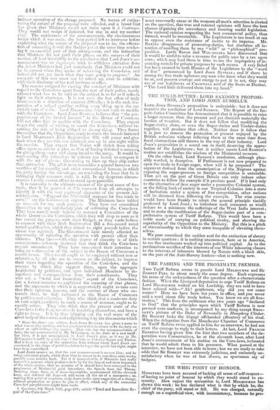TIIE SUGAR-DUTIES: LORD SANDON'S PROPOSITION, AND LORD JOHN RUSSELL'S.
LORD Jonas RUSSELL'S proposition is undeniable: but it does not negative the resolution of Lord BANDON. The Report of the Import-duties Committee has demonstrated that it is possible to raise a larger revenue than the present and yet diminish materially the burden of taxation. But it does not follow that modifying the Sugar-duties alone, or even the Sugar-duties and Timber-duties together, will produce that effect. Neither does it follow that it is just to remove the protection at present enjoyed by the British colonists without relieving them at the same time from fiscal obstructions still thrown in the way of their industry. Lord JOHN'S proposition is a sound one in itself; deserving the approbation of the Legislature ; but it neither meets Lord BANDON'S motion nor establishes the wisdom of the Ministerial measure.
On the other hand, Lord BANDON'S resolution, although plausibly worded, is deceptive. If Parliament is not now prepared to open the trade in foreign sugar, when will it be prepared ? The argument derived from the emancipation of the Negroes against exposing the sugar-growers to foreign competition is untenable. That act on the part of Great Britain can only induce other countries to follow the example if it produce good. If it lead only to the alternative of dear sugar under a protective Colonial system, or the falling back of society in our Tropical Colonies into a state of barbarism under a system of free competition, other nations will be deterred from following the example. The wise course would have been frankly to adopt the general principle timidly professed by Lord Jonas; to introduce such measures as wbuld reduce to a minimum the sufferings of the West India interest; and to make the modification of the Sugar-duties part of a comprehensive system of Tariff Reform. This would have been a noble mode of carrying on political rivalry, and showing the superiority of the Opposition to the Ministry. But this is a pitch of statesmanship to which they seem incapable of elevating themselves.
We pass unnoticed the sudden zeal for the extinction of slavery in certain quarters : it is nothing uncommon, here or in America, to see fine sentiments worked up into political capital. As to the pertinacious sacrifice of the interests of our White labouring classes to the interests of labourers blessed by Nature with a black skin, on the part of the Anti-Slavery leaders—that is nothing new.


























 Previous page
Previous page